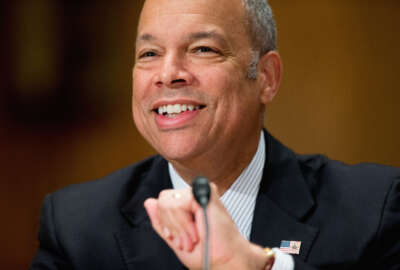
Mayorkas reflects on 3 years’ leadership at DHS
Alejandro Mayorkas, deputy secretary for the Homeland Security Department, said he's spent the last three years building the foundations for key programs within...
As the Homeland Security Department’s number two leader, Alejandro Mayorkas says he sees his job as one that would build the agency that his employees deserve.
“What it involves, and what we’ve done, is it involves listening to employees, understanding what their concerns and their issues and their challenges are, and addressing them in a very concerted effort,” said Mayorkas, whose last day at the department is Oct. 28.
Now after about seven years at DHS, Mayorkas said he believes the department has the “institutional mechanisms” to carry forward the Unity of Effort initiative and others that he helped implement during his tenure — well into the future.
For example, Mayorkas led the DHS Employee Engagement Working Group, which developed ways that the department could turn around six years of slumping employee feedback and satisfaction on the annual Federal Employee Viewpoint Survey.
DHS this year reversed the trend and improved employee engagement by 3 percent on the 2016 FEVS. Though still ranked last among large agencies, Mayorkas sees it as a foundation for future success.
“It’s a great start,” he said. “We’re very proud that the down slide has stopped, that we’ve turned the corner and we’re on the up-swing in terms of positive feedback from the workforce. But our work has begun. Given the mission that we have and given the extraordinary people that we have throughout this department, we should be at a very, very top of the ‘Best Places to Work in the Federal Government.'”
Mayorkas and Secretary Jeh Johnson traveled throughout the country over the past three years, holding town halls with DHS employees and visiting field offices. From those conversations, they learned that many employees were frustrated that they often learned about job promotions or opportunities after they had already filled.
Turning that frustration around became a priority for Mayorkas.
“[We’ve tried to create] the notion of transparency in the hiring and promotion process,” he said. “What are the criteria? Is a position available? What are the skills that people are looking for? What will the process of candidate selection be? What will the timeline be — those fundamental questions that speak to the fairness and openness of the process, so everyone who may be qualified feels as though they have a chance. That is one thing that we’ve done.”
Mayorkas said he still sees challenges with cybersecurity and developing better industry relationships, both areas where he’s played a role in the department’s work over the past three years.
But he sees that progress as a foundational stepping stone in the department’s future, particularly as all 22 DHS components begin to think more jointly about their acquisition and technology.
“The collaboration on discrete efforts and projects and some of the core groundwork have been far more coordinated than ever before,” Mayorkas said. “It’s really a terrific sea change. We’re improving in the area of collaboration with industry, but I think we have more progress to achieve there.”
Mayorkas was also one of the driving forces behind the implementation of the DHS cyber threat information sharing network. He’s happy with the participation rate so far but wants to see more organizations come on board more quickly.
“There’s a lot of room for growth,” he said. “We are encouraging members of the private sector to participate in that program. We’re very pleased with the traction we’ve gained. I would hope that that continues to grow exponentially, quite frankly.”
Mayorkas spent most of his career as a federal prosecutor, where he first developed a passion for criminal justice. He joined U.S. Citizenship and Immigration Services in 2009 as its director. He soon discovered an appreciation for other interests as DHS deputy secretary.
“Coming to this department, I’d been exposed to an extraordinarily broad array of issues impacting homeland security, and I’m passionate about all of them,” he said. “To be honest with you, when I think of the course of our national security work, the security of the American people, I am deeply passionate about that and have become quite [an] expert in the issues of that area. Cyber … countering violent extremism, the work of the Coast Guard and the criticality of the Arctic strategy, our international engagements with our partners, whether it’s information sharing or achieving the groundbreaking homeland security agreement with the Republic of Cuba, the naturalization process and the notion of welcoming individuals as citizens to this country, a process I myself went through in 1973.”
As a leader in the department, Mayorkas said his motto has been to “resource, invest and empower” his employees, advice he said he’d hand over to the next DHS deputy secretary.
“Be an impact leader,” an impact leader with respect to our workforce most importantly, but an impact leader with the respect to the mission as well,” he said. “There are critical areas that need continued, vigilant attention, both on the development of the mission and on the execution of that mission.”
Now, Mayorkas will return to the field where he got his start. He plans to join the law firm WilmerHale in Washington.
“I’m very excited about that,” he said of his new position. “But one day I hope to return to government service,” he said. “It is my love and passion.”
Copyright © 2024 Federal News Network. All rights reserved. This website is not intended for users located within the European Economic Area.
Nicole Ogrysko is a reporter for Federal News Network focusing on the federal workforce and federal pay and benefits.
Follow @nogryskoWFED




